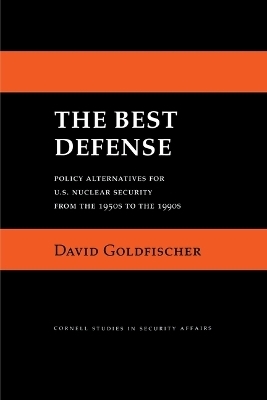
The Best Defense
Policy Alternatives for U.S. Nuclear Security from the 1950s to the 1990s
Seiten
2025
Cornell University Press (Verlag)
978-1-5017-7905-3 (ISBN)
Cornell University Press (Verlag)
978-1-5017-7905-3 (ISBN)
- Noch nicht erschienen (ca. Februar 2025)
- Portofrei ab CHF 40
- Auch auf Rechnung
- Artikel merken
The Best Defense considers fundamental questions regarding the United States and the Soviet Union acquiring capabilities to destroy each other in a nuclear war. Was it inevitable? Or could they have agreed instead to address the nuclear danger through mutual emphasis on defenses? Might such an approach be a feasible option for nuclear powers in today's world?
David Goldfischer looks at how figures including J. Robert Oppenheimer, Donald G. Brennan, Freeman Dyson, and Jonathan Schell advanced compelling arguments for seeking an arms control agreement favoring defenses against nuclear attack. First developed by Oppenheimer as an alternative to a dangerous reliance on strategic bombing and again proposed in the 1960s as preferable to basing arms control on "mutual assured destruction," mutual defense emphasis was briefly adopted as a US arms control proposal when the cold war waned in the mid-1980s.
The Best Defense offers provocative explanations for why this approach was rejected and argues that the compelling need to protect populations makes mutual defense emphasis the most promising basis for an enduring nuclear arms control and disarmament regime.
David Goldfischer looks at how figures including J. Robert Oppenheimer, Donald G. Brennan, Freeman Dyson, and Jonathan Schell advanced compelling arguments for seeking an arms control agreement favoring defenses against nuclear attack. First developed by Oppenheimer as an alternative to a dangerous reliance on strategic bombing and again proposed in the 1960s as preferable to basing arms control on "mutual assured destruction," mutual defense emphasis was briefly adopted as a US arms control proposal when the cold war waned in the mid-1980s.
The Best Defense offers provocative explanations for why this approach was rejected and argues that the compelling need to protect populations makes mutual defense emphasis the most promising basis for an enduring nuclear arms control and disarmament regime.
David Goldfischer is Associate Professor at the Josef Korbel School of International Studies, University of Denver.
| Erscheint lt. Verlag | 15.2.2025 |
|---|---|
| Reihe/Serie | Cornell Studies in Security Affairs |
| Verlagsort | Ithaca |
| Sprache | englisch |
| Maße | 155 x 235 mm |
| Gewicht | 454 g |
| Themenwelt | Sozialwissenschaften ► Politik / Verwaltung ► Staat / Verwaltung |
| ISBN-10 | 1-5017-7905-2 / 1501779052 |
| ISBN-13 | 978-1-5017-7905-3 / 9781501779053 |
| Zustand | Neuware |
| Informationen gemäß Produktsicherheitsverordnung (GPSR) | |
| Haben Sie eine Frage zum Produkt? |
Mehr entdecken
aus dem Bereich
aus dem Bereich
Organisationen steuern, Strukturen schaffen, Prozesse gestalten
Buch | Softcover (2024)
Rehm Verlag
CHF 53,20


